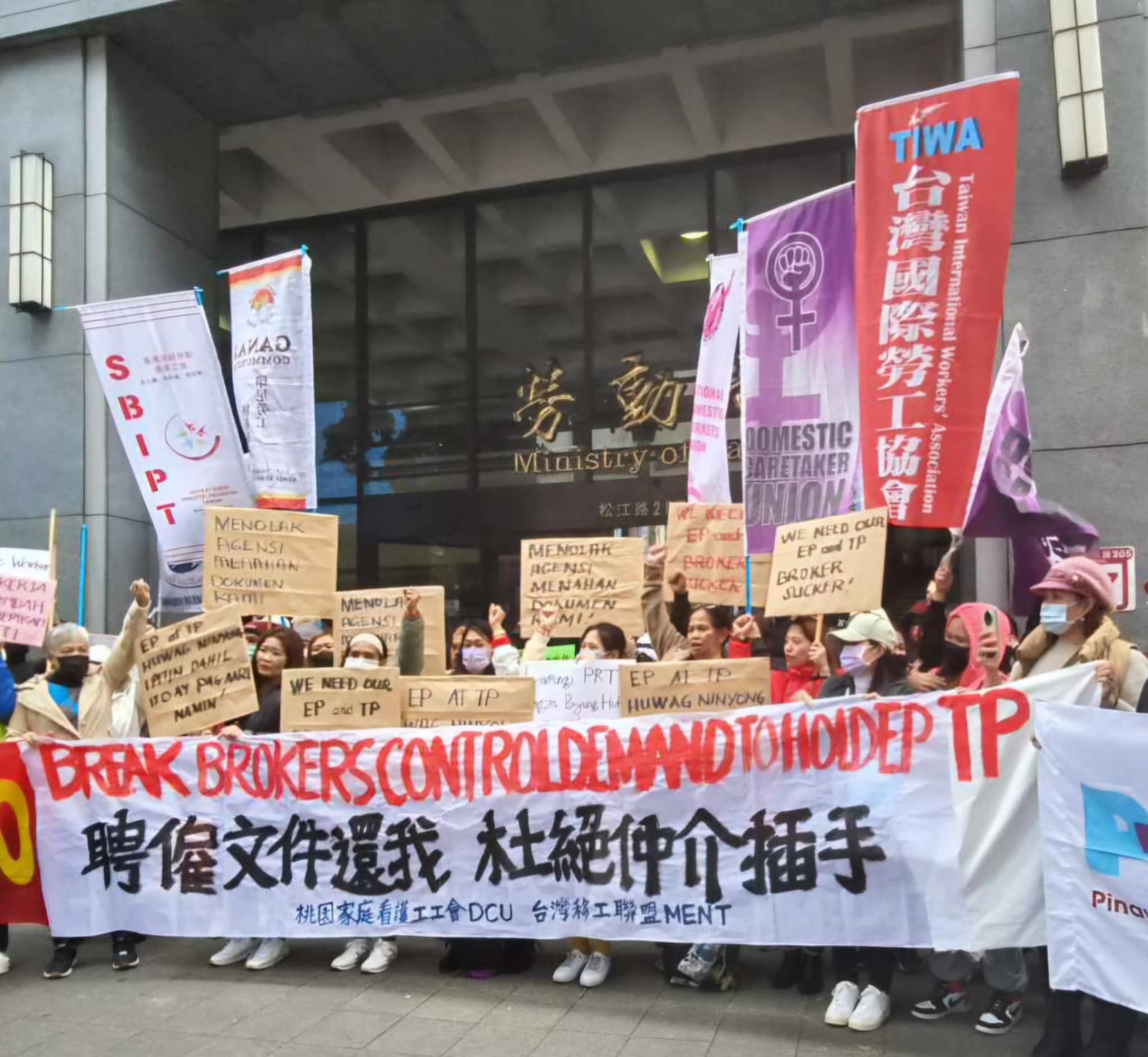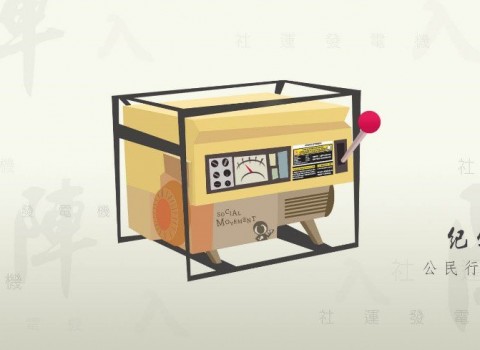文/桃園市家庭看護工職業工會(DCU)、台灣移工聯盟(MENT)
Press Release: Break Free from Brokers Control Demand to hold our EP& TP
12月15日上午,桃園市家庭看護工職業工會及台灣移工聯盟至勞動部前陳情,指出台灣引進移工已經30餘年,絕大多數的移工卻從來不曾保有自己的聘僱許可和轉換許可等文件。數個移工工會及人權團體也到場聲援,要求勞動部正視仲介強制保管文件造成的剝削亂象。
On the morning of December 15, the Domestic Caretkers Union Taoyuan (DCU) and the Migrants Empowerment Network Taiwan(MENT) staged a petition in front of the Ministry of Labor. They highlighted that despite Taiwan introducing migrant workers over 30 years ago, the vast majority of these workers have never retained their own employment permits or transfer permits. Several migrant worker unions and human rights organizations were also present to show their support, urging the Ministry of Labor to address the exploitation caused by brokers’ forced retention of these critical documents.
家庭看護工工會代表Cris指出,聘僱許可和轉換許可都是由勞動部所發出。聘僱許可載明許可工作的對象、地點及工作期間,是移工證明自己合法工作最重要的文件,居留效期、社會保險等效期都以此為依據。而轉換雇主許可則是移工合法轉換雇主的證明,移工可以持轉換雇主許可與任何有聘僱資格的新雇主締約。但這兩份文件長期都由仲介把持,不僅是移工,連雇主都拿不到,甚至不知道有這些文件存在。
Cris, a representative of DCU, explained that both the employment permit and transfer permit are issued by the Ministry of Labor. The employment permit specifies the work location, employer, and duration of employment, making it the most crucial document for proving a migrant worker’s legal employment status, including the validity of their residence and social insurance. The transfer permit, on the other hand, serves as proof that a worker is authorized to change employers legally and allows them to sign contracts with new qualified employers. However, these two documents are long held by brokers. Neither migrant workers nor employers can typically access them, with many even unaware of their existence.
台灣照顧勞動產業工會理事Ayu說,私人仲介長期以保管之名扣留移工的聘僱文件,並藉此向移工的新雇主或新仲介索取「買工費」或「文件費」,這些費用經常也被轉嫁到移工身上。換言之,移工經常被迫支付費用「贖回」本應無條件擁有的文件。Ayu認為「仲介的做法將移工推入了殘酷剝削的循環。」
Ayu, a director of SBIPT, pointed out that private brokers often confiscate migrant workers’ employment documents under the pretext of “safekeeping.” They then exploit this control to demand “transfer fees” or “document fees” from either the workers’ new employers or the workers themselves. These costs are often passed back to the migrant workers, forcing them to pay to “redeem” documents they are entitled to possess unconditionally. Ayu criticized brokers’ actions, stating that “such practices trap migrant workers in a vicious cycle of exploitation.”
只要拿回轉換雇主許可,移工就可以透過直聘中心或是新仲介找到工作。對很多仲介來說,這意味著不能繼續賺移工的錢。Cris提到,有仲介在移工索回轉換雇主許可時,乾脆向勞動部謊稱移工逃跑,讓移工失去在台合法工作資格。依據《就業服務法》,扣留移工證件是禁止行為。但是Cris提出工會的經驗,表示當移工透過1955申訴要取回文件,地方勞工主管機關不但不開罰,還經常放任仲介不歸還給移工,儼然是仲介剝削的幫兇。
With the transfer permit in hand, migrant workers could find jobs through direct hiring centers or new brokers. However, for brokers, this disrupts their revenue stream from migrant workers. Cris revealed that some brokers, in retaliation, falsely report migrant workers as absconding to the Ministry of Labor, stripping them of their legal status in Taiwan. Although withholding migrant workers’ documents is prohibited under the Employment Services Act, Cris noted that when workers lodge complaints via the 1955 hotline to retrieve their documents, local labor authorities often fail to impose penalties and allow brokers to withhold the documents, effectively enabling the exploitation.
台灣移工聯盟陳容柔指出,現任勞動部長洪申翰在擔任立委期間,多次要勞動部改善移工文件及證件被保管的情形,甚至在剛上任並接受媒體訪問時,也曾說過「買工費」就是不當仲介的剝削行為,減少剝削對雇主以及移工都有好處。因此,聯盟向部長喊話捍衛自己的主張,正視仲介「假保管、真索費」的亂象。陳容柔也點出,勞動部面對移工團體廢除私人仲介的訴求,一再以已經有直聘中心來回應。但事實上連直聘中心都常常搞不清楚聘僱許可發了沒有,也不會提醒雇主應該把聘僱許可交還給移工本人。
Chen Rong-rou of MENT remarked that the current Minister of Labor, Hong sun-han, had repeatedly called on the Ministry to resolve the issue of brokers withholding migrant workers’ documents during her tenure as a legislator. Upon assuming his ministerial role, he also publicly condemned “buy work fees” as a form of unjust exploitation by brokers, emphasizing that reducing such exploitation would benefit both employers and workers. The Alliance urged the minister to stand by his position and address the problem of brokers abusing their authority under the guise of “safekeeping” to extract fees. Chen also criticized the Ministry for dismissing calls to abolish private brokers by citing the existence of direct hire service centers, which themselves often fail to ensure workers receive their employment permits and lack mechanisms to remind employers to return these documents to the workers.
群眾服務協會蕭以采也表示,移工遭受原仲介不當對待,自然會想要換仲介。但沒有轉換許可,移工就算找到新雇主也沒辦法上工。就算跟1955申訴要換仲介也沒有用,「移工必須要清楚說出自己的申訴標的是索回轉換許可函。」問題是:「移工根本不知道這個文件存在,因為從來沒看過。」
Hsiao Yi-cai from the Service the People Association pointed out that when migrant workers face mistreatment from brokers, they naturally wish to switch brokers. However, without a transfer permit, workers cannot begin work even if they find a new employer. Filing complaints via the 1955 hotline to switch brokers is also ineffective unless workers specifically request the transfer permit by name. The issue, Hsiao noted, is that many workers are entirely unaware of the existence of these permits, as they have never seen them.
台灣人權促進會施逸翔特別指出,扣留移工的證件已經構成國際勞工組織「強迫勞動」指標之一,是非常嚴重的剝削行為。除了支持此次行動以外,施逸翔也呼籲勞動部盡快將第189號家務勞動公約國內法化,以保障家事移工的勞動權益。
Shih Yi-Hsiang of the Taiwan Association for Human Rights emphasized that withholding workers’ documents constitutes one of the International Labour Organization’s indicators of “forced labor,” making it a severe form of exploitation. Shih not only voiced support for this action but also urged the Ministry of Labor to expedite the domestication of the ILO Domestic Workers Convention No. 189 to safeguard the labor rights of domestic workers.
記者會最後,共同行動團體提出三點訴求:
一、 聘僱許可、轉換雇主許可等文件發出時必須以簡訊或電子郵件通知移工,並交由移工自行保管,不得由仲介或雇主保管或扣留。
二、 提高仲介及雇主保管及扣留移工聘僱許可、轉換雇主許可等文件之罰則並徹底落實。
三、 勞工主管機管執行移工入國或到職訪視時,必須確實確認移工有自行保管聘僱許可、護照、居留證等文件及證件。
At the end of the press conference, the coalition of organizations presented three key demands:
1. The employment permit and transfer permit must be issued with notification via SMS or email to the migrant workers and handed directly to them for safekeeping. These documents must not be withheld by brokers or employers.
2. Penalties for brokers and employers who withhold or confiscate employment permits, transfer permits, or similar documents must be increased and strictly enforced.
3. During inspections of migrant workers upon arrival or during follow-up visits, labor authorities must verify that workers personally retain their employment permits, passports, ARC, and other critical documents.




